Filter News
Area of Research
- Advanced Manufacturing (1)
- Biology and Environment (3)
- Clean Energy (6)
- Fusion and Fission (2)
- Fusion Energy (6)
- Materials (4)
- Materials for Computing (2)
- National Security (2)
- Neutron Science (1)
- Nuclear Science and Technology (5)
- Nuclear Systems Modeling, Simulation and Validation (1)
- Supercomputing (4)
News Type
News Topics
- (-) Advanced Reactors (18)
- (-) Coronavirus (15)
- 3-D Printing/Advanced Manufacturing (48)
- Artificial Intelligence (21)
- Big Data (18)
- Bioenergy (20)
- Biology (24)
- Biomedical (15)
- Biotechnology (3)
- Buildings (23)
- Chemical Sciences (20)
- Clean Water (13)
- Climate Change (26)
- Composites (13)
- Computer Science (55)
- Critical Materials (12)
- Cybersecurity (9)
- Decarbonization (10)
- Energy Storage (46)
- Environment (57)
- Exascale Computing (4)
- Frontier (4)
- Fusion (17)
- Grid (23)
- High-Performance Computing (23)
- Hydropower (6)
- Irradiation (3)
- Isotopes (12)
- ITER (4)
- Machine Learning (12)
- Materials (67)
- Materials Science (51)
- Mathematics (1)
- Mercury (3)
- Microscopy (20)
- Molten Salt (6)
- Nanotechnology (24)
- National Security (10)
- Net Zero (1)
- Neutron Science (41)
- Nuclear Energy (34)
- Partnerships (6)
- Physics (10)
- Polymers (13)
- Quantum Computing (6)
- Quantum Science (14)
- Security (4)
- Simulation (11)
- Software (1)
- Space Exploration (11)
- Statistics (1)
- Summit (8)
- Sustainable Energy (50)
- Transformational Challenge Reactor (1)
- Transportation (44)
Media Contacts

Anne Campbell, a researcher at ORNL, recently won the Young Leaders Professional Development Award from the Minerals, Metals & Materials Society, or TMS, and has been chosen as the first recipient of the Young Leaders International Scholar Program award from TMS and the Korean Institute of Metals and Materials, or KIM.
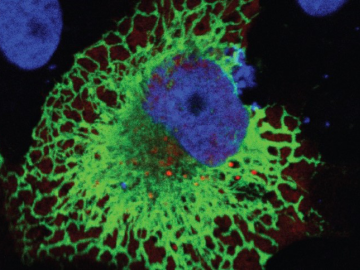
Oak Ridge National Laboratory scientists exploring bioenergy plant genetics have made a surprising discovery: a protein domain that could lead to new COVID-19 treatments.

A partnership of ORNL, the Tennessee Department of Economic and Community Development, the Community Reuse Organization of East Tennessee and TVA that aims to attract nuclear energy-related firms to Oak Ridge has been recognized with a state and local economic development award from the Federal Laboratory Consortium.
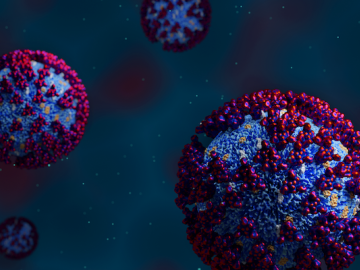
Researchers from ORNL, the University of Tennessee at Chattanooga and Tuskegee University used mathematics to predict which areas of the SARS-CoV-2 spike protein are most likely to mutate.
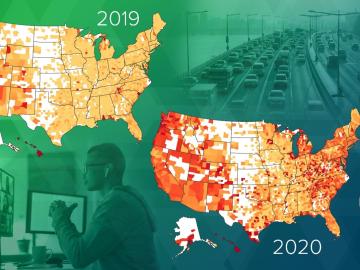
Researchers at Oak Ridge National Laboratory have empirically quantified the shifts in routine daytime activities, such as getting a morning coffee or takeaway dinner, following safer at home orders during the early days of the COVID-19 pandemic.

An Oak Ridge National Laboratory team developed a novel technique using sensors to monitor seismic and acoustic activity and machine learning to differentiate operational activities at facilities from “noise” in the recorded data.
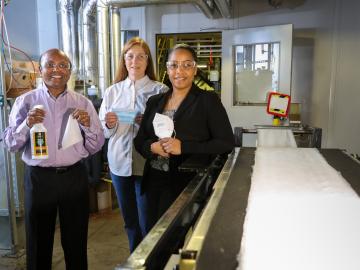
Oak Ridge National Laboratory researchers collaborated with Iowa State University and RJ Lee Group to demonstrate a safe and effective antiviral coating for N95 masks. The coating destroys the COVID-19-causing coronavirus and could enable reuse of masks made from various fabrics.

ORNL, TVA and TNECD were recognized by the Federal Laboratory Consortium for their impactful partnership that resulted in a record $2.3 billion investment by Ultium Cells, a General Motors and LG Energy Solution joint venture, to build a battery cell manufacturing plant in Spring Hill, Tennessee.
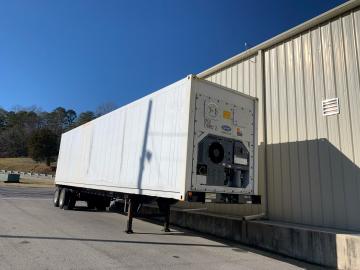
Oak Ridge National Laboratory researchers have retrofitted a commercial refrigeration container designed to ensure COVID-19 vaccines remain at ultra-low temperatures during long transport and while locally stored.
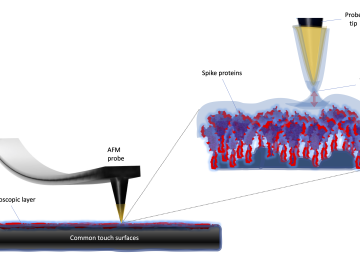
A study by Department of Energy researchers detailed a potential method to detect the novel coronavirus




